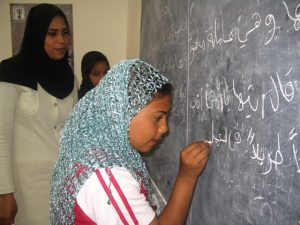During 2023 the interventions to support the Egyptian TVET system continued and contributed to promote skills that meet the needs of the local labor market and increase the competitiveness of Egyptians in regional and global markets. During the second phase of the Italo-Egyptian Debt Conversion Program, an Italo-Egyptian Integrated Technical Education Center (ITEC project) was established in the electronics and mechanical manufacturing sector in Fayoum Governorate, which succeeded in establishing a pilot model of technical education, serving industrial sectors of national priority. The ITEC project in Fayoum is one of the flagship projects of the Italian Cooperation in Egypt. Since its inception, it has been essential to create a link between the vocational and technical education system and the private sector, adapting training modules to the real needs of the Egyptian labor market.
As a result of the positive results achieved by the ITEC in Fayoum, during the third phase of the ongoing Italian-Egyptian Debt Conversion Program, a new high school was established within the same ITEC and a new integrated technical education hub was created in the city of Abu Ghaleb, Giza Governorate. In addition, in 2020, again as part of the third phase of the Program, a new intervention was launched that will contribute to the improvement of the quality of technical education in the country through the establishment of forty of the more than one hundred schools of applied technology (ATS) that are aimed to be established in the country, managed by a unit based in the Ministry of Education. The initiative aims to train students with certified skills recognized by employers nationally, regionally and internationally and to further education.
Within the same sector, the project “Support for Improvement of Nursing Care in Three Governorates in Egypt,” which started in 2019 in continuity with a previous program, ended in March 2023 with the satisfaction of the Egyptian Ministry of Health and Population (MOHP), which requested a third phase. The new program, “Supporting the Improvement of Medical and Nursing Care in Egypt – Phase III,” deliberated in July 2023, will begin in 2024 in continuity with previous activities aimed at contributing to the improvement of the health of the Egyptian population. The third phase will continue to promote exchanges, through scholarships, and mentorship with Italy, will keep the pediatric heart disease outpatient clinic in Port Said running, and will support missions of Italian surgeons to Cairo for pediatric heart disease operations.
Moreveover, the program also includes some new features and it will promote: medical as well as nursing care in the Governorates of Cairo, Giza, and Alexandria; assistance in improving the management of cases requiring bone marrow transplantation in Cairo; support for the development of clinical and diagnostic protocols operating procedures of nurses and physicians in the field of pediatric oncology and cardiac surgery; patient-related data collection and analysis and research in collaboration with the scientific directorates of Dar El Salam Cancer Hospital, Zayed Cancer Hospital, Nasser Institute for Research, and Children Cancer Hospital on the topic of fact-jacie accreditation (car-t a and gene therapy).
Furthermore, also the implementation of the Water Knowledge initiative is ongoing, in cooperation with the Bari IAM for a two-year duration with the aim of improving the managerial and technical skills of water resource workers in Egypt and the region. Despite delays in the start of field activities, after the approval of June 18, 2023, activities took an accelerated lane, and the upgrading of the RTCWRI’s training infrastructure was completed (following the findings of the needs assessment, the water quality laboratory was rehabilitated, the technical scheme for the pilot/demo area was finalized, as well as the equipment of the pilot project including sensors and IoT, IT materials and media room equipment has been completed), as well as the implementation of seven training courses, which following the definition of the training pillars carried out during the inception phase, involving more than 288 trainees, 66 trainers and several Egyptian, Italian and international institutions.
